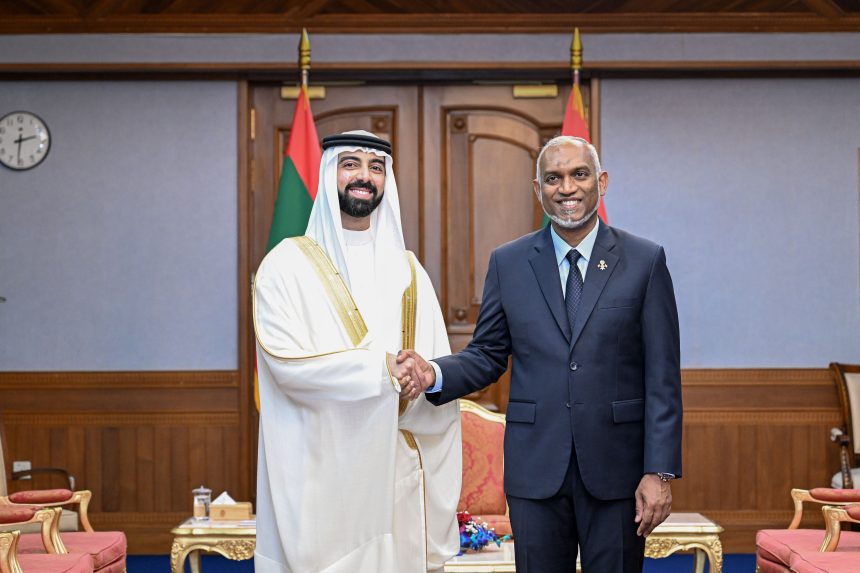In a recent diplomatic engagement, President Mohamed Muizzu of the Maldives met with Prince Fahad Saud Al-Sha’la, who presented a commitment letter to invest in the nation’s first international financial center. This meeting has sparked discussions regarding Prince Fahad’s royal status, with some media outlets questioning his affiliation with the Saudi royal family.
A closer examination of Prince Fahad’s lineage reveals deep-rooted connections to the House of Saud. His paternal heritage traces back to the Al-Sha’lan family, a prominent lineage within the Al-Ruwallah tribe. Notably, his great-great-grandfather, Nuri bin Hazaa Al Shalaan, was a significant tribal leader who forged alliances with various ruling entities in the region, including the Al Saud family.
The intertwining of the Al-Sha’lan and Al Saud families is further evidenced by strategic marital alliances. Prince Fahad’s grandfather, Fawaz bin Nawaf Al-Sha’lan, married Princess Fahda bint Abdullah bin Abdulaziz Al Saud, linking Prince Fahad directly to the royal bloodline. This connection is reinforced by other family marriages, such as Prince Fahad’s uncle, Nawaf, who wed a daughter of the late King Abdullah.
While Prince Fahad holds the title of “Amir,” traditionally used for members of the Al-Sha’lan family, it’s important to note that the designation “Royal Highness” is reserved for direct descendants of King Abdulaziz. Nevertheless, Prince Fahad’s maternal and paternal ties to the royal family underscore his esteemed position within Saudi Arabia’s noble circles.
Beyond his lineage, Prince Fahad’s family has been active on the international stage. His father, Saud Al-Sha’lan, garnered attention for his candid remarks in international media concerning U.S. warnings to Saudi Arabia. Educated in Western institutions, Saud and his half-brother Nawaf are recognized as influential businessmen in the kingdom.
The recent meeting between President Muizzu and Prince Fahad signifies a potential strengthening of economic ties between the Maldives and Saudi Arabia. As the Maldives seeks to establish itself as a financial hub, partnerships with figures of Prince Fahad’s stature could play a pivotal role in shaping the nation’s economic future.
In light of these revelations, it’s evident that Prince Fahad Saud Al-Sha’lan’s connections to the Saudi royal family are both profound and multifaceted, encompassing both bloodlines and longstanding alliances.
In a recent diplomatic engagement, President Mohamed Muizzu of the Maldives met with Prince Fahad Saud Al-Sha’lan, who presented a formal commitment to invest in the Maldives’ first international financial center. The meeting, while warmly received by Maldivian officials, sparked questions in some media outlets about Prince Fahad’s royal status. A closer examination of his lineage reveals a rich heritage intertwined with Saudi Arabia’s royal family and tribal aristocracy.
Prince Fahad descends from the Al-Sha’lan family—one of the most powerful families of the Al-Ruwallah tribe, a historically influential tribe spread across the Arab world. His great-great-grandfather, the famed Amir Nuri bin Hazaa Al-Sha’lan, played a prominent role in regional politics and maintained authority long after the establishment of the Saudi kingdom. To this day, the Al-Sha’lan family is officially addressed by the title “Amir” or “Prince” within the Kingdom of Saudi Arabia.
Although Prince Fahad is not a direct descendant of the ruling Al Saud line, his family is closely linked to it through a series of royal marriages. Notably, Nouf bint Nawaf Al-Sha’lan, a member of Fahad’s extended family, married King Abdulaziz Al Saud—the founder of modern Saudi Arabia. This union produced sons, including Prince Thamir and Prince Mashhoor, integrating the Al-Sha’lan lineage into the royal house.
Prince Fahad’s full name—Fahad Saud Al-Sha’lan—traces his ancestry to both tribal and royal lineage. His grandfather, Fawaz bin Nawaf Al-Sha’lan, was married to Princess Fahda bint Abdullah bin Abdulaziz Al Saud, making Prince Fahad a royal descendant on his maternal side. His father, Saud Al-Sha’lan, is known for his global business influence and has previously appeared in international media to discuss sensitive geopolitical topics concerning Saudi Arabia.
Furthermore, several of Prince Fahad’s paternal uncles are married into the Al Saud family. His uncle Nawaf is married to a daughter of the late King Abdullah bin Abdulaziz, and another uncle, Naif, is similarly connected through marriage to a daughter of Prince Abdulrahman bin Abdulaziz Al Saud.
These familial ties, both maternal and paternal, firmly establish Prince Fahad’s status within the royal aristocracy of Saudi Arabia. While the title “Royal Highness” is formally reserved for direct descendants of King Abdulaziz, Prince Fahad carries the title of “His Highness”—a customary recognition of noble stature within Saudi Arabia’s traditional hierarchy.
Contrary to media reports dismissing his royal connection, Prince Fahad Saud Al-Sha’lan holds legitimate claims to princely status. His position is not one of self-attribution but the result of a deeply rooted lineage shaped by generations of noble alliances and tribal leadership.
As the Maldives moves forward with its vision to become a financial and economic bridge between Asia and the Middle East, the involvement of high-ranking partners like Prince Fahad Saud Al-Sha’lan signals growing confidence in the country’s global potential.



